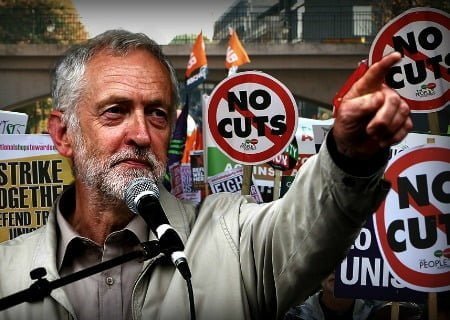The proposed formation of a so-called English Labour Network by Jon Cruddas MP represents another desperate attempt by elements inside the PLP at Westminster to undermine Corbyn and his left-wing programme. Rather than blaming migrants and promoting “patriotism”, Labour should be fight for socialist policies.
The proposed formation of a so-called English Labour Network (ELN) by Jon Cruddas MP represents another desperate attempt by elements inside the PLP at Westminster to undermine Corbyn and move away from the fight for socialist policies.
The ELN is a continuation of the “traditional working class” approach that has been grimly pushed by certain Blairites for some time now. This strategy argues that “traditional” (i.e. white) voters in the de-industrialised wastelands of Britain – those workers who used to have skilled jobs in factories and workshops – are disconnected from Labour and from a system which has neglected them for decades.
Who is to blame? In an introduction to the launch of the ELN, Cruddas spells it out: these English workers “live where the economy has taken away good jobs and [where] rapid migration has been disconcerting.”
So all the problems facing these workers, we are told, are not down to capitalism, bankers’ greed, Tory austerity cuts, or the economic crisis, but rather because of “disconcerting” migration. It is as though migrant workers arrived in this country (often because of a skills shortfall in the UK, we should note) and demanded that factories and workplaces were shut down – and that the bosses pay them less for good measure!
This is a laughable concept. Yet it is one that the likes of UKIP, the Tory right, the gutter press, and the rest have been pushing for decades now. Now elements of the Labour right wing seem to be joining in, pandering to these prejudices – just as they went along with supporting Tory austerity in the past.
The scars of capitalism
 The main damage to the deindustrialised areas of the Midlands and North (and elsewhere) is down to the capitalists and their representatives in parliament. It was they who shut down the factories, closed the ports, docks and coalmines, transferred work to cheap labour abroad – all to maximize profits. The Tories and Blairites led the way in promoting a shift in the UK economy from industry to finance as investment fell away and productivity levels fell.
The main damage to the deindustrialised areas of the Midlands and North (and elsewhere) is down to the capitalists and their representatives in parliament. It was they who shut down the factories, closed the ports, docks and coalmines, transferred work to cheap labour abroad – all to maximize profits. The Tories and Blairites led the way in promoting a shift in the UK economy from industry to finance as investment fell away and productivity levels fell.
The Tories and New Labour had no interest in creating decent new jobs to replace those lost. Workers flung on the dole were usually just offered the potential of precarious jobs, usually low-paid, often in other parts of the country, as if people could just move around at will or work for nothing. Naturally, the bosses took every opportunity to try and hold pay down. Indeed, since the crisis of 2008, wages in the UK have been falling in real terms, whilst profits for the rich have continued to rise. The fault for this lies not with migrants, but with the bosses and the bankers.
If that was not enough, many of the areas hardest hit by deindustrialisation have also been the worst hit by public sector cuts. The capitalists are happy to build nice luxury homes for the “upwardly mobile”, but the old council estates have been left to rot, or replaced by shoddy new estates, built on the cheap. Town centres have declined and become wastelands, full of empty shops and shoppers with no money. Pubs now open in the morning to cater for those with nowhere to go and are full of middle-aged men by 9.30am, drinking because they have nothing else to do.
Reactionary poison
 Under such conditions, and with no alternative on offer, these people have been left open to the poison of all manner of reactionary excuses to explain their fate. Migrants are seen as an easy and visible target and have duly been jumped on by the reactionary and racist establishment. Yet migrants are not to blame.
Under such conditions, and with no alternative on offer, these people have been left open to the poison of all manner of reactionary excuses to explain their fate. Migrants are seen as an easy and visible target and have duly been jumped on by the reactionary and racist establishment. Yet migrants are not to blame.
This anti-migrant narrative is often linked by English reactionaries to a belief that, in some way, good-old England is being cheated out of what is their due, first by Europe and then by those moaning ingrates in Scotland and Wales.
You might well expect to hear such rubbish from “little Englanders” in the pub, but not from representatives of the Labour movement. Yet, Cruddas argues: “All moves to decentralise power within England – whether to city regions, counties or local authorities – have failed, often because the interests of Scotland and Wales have come before those of England.”
Notice that Cruddas does not explain which England he means here – the bosses’ England or the workers? Instead he goes on to rant against “…resentment at the perceived unfairness of the UK’s financial and political settlement.” In other words, it is all apparently about people walking around muttering about how well the Scots and Welsh are doing. Anyone who lives in or has visited Scotland or Wales recently will be wondering just where all these lucky people are hiding.
What we have here are people like Cruddas whipping up from thin air a problem and then demanding that something is done about it. People only complain about migrants or better deals for the Welsh and Scots – or for Londoners, for that matter – because the establishment just keeps going on about it, as if it was all proven facts. Nothing could be further from the truth.
Caricature of the working class
In fact, this reactionary view of the English working class is nothing but an Alf-Garnett-style caricature. The “traditional working class” is presented as being like something out of a 1940s film – wearing clogs and saying “gord-bless you” to any upper-class toff who might be walking by. For good measure, these workers are usually also portrayed as being pro-nuclear power, anti-union, and obsessed with the monarchy, law and order and “the war”. They are certainly always presented as being anti-Corbyn.
The general election showed the real face of the working class, with exit-poll analysis indicating that people overwhelmingly shifted to Labour during the campaign because of the left-wing policies and leadership offered. Dominant reasons given for voting Labour were concerns over the NHS, public services, education, student fees, low pay and so on.
Yet we are told by Cruddas that workers were put off Labour, with concerns that the party is not “patriotic” enough. In response, Cruddas assures us that: “Labour is the patriotic party, for both England and for Britain…only Labour can forge the progressive patriotic vision, a country run in the interests of the many, not the few, that we so desperately need.” No socialist internationalism here then.
This all sounds like something the Tories or UKIP (whose patriotic gibberish did them little good in the June election) might have said.
Rather than pandering to these half-baked views, Cruddas and his friends should be campaigning for socialist policies that will have a real effect on the lives of all working class people – “traditional”, English or otherwise. In the end, workers will see through all this flag waving.
Fight for international socialism
 One reason why people in certain seats in the Midlands and the North were less keen to vote Labour is a deep seated resentment over the failure of past Labour governments – not to mention past and present Labour councils, many of which have been Labour-controlled for decades, yet have done little in recent times other than carry out the Tory government’s austerity demands. In fact some of the worst turnouts to vote have been in seats held by Blairite cronies. Even then, no part of the UK had a swing to Labour below 8.6%, we should note, thanks to the inspiring Corbyn-led Labour campaign. Cruddas and co. ignore all this, of course.
One reason why people in certain seats in the Midlands and the North were less keen to vote Labour is a deep seated resentment over the failure of past Labour governments – not to mention past and present Labour councils, many of which have been Labour-controlled for decades, yet have done little in recent times other than carry out the Tory government’s austerity demands. In fact some of the worst turnouts to vote have been in seats held by Blairite cronies. Even then, no part of the UK had a swing to Labour below 8.6%, we should note, thanks to the inspiring Corbyn-led Labour campaign. Cruddas and co. ignore all this, of course.
Do not be swayed by the arguments of the ELN. A fight around a bold socialist programme – one which could offer real hope to those who have been thrown on the scrapheap – would cut across the reactionary rubbish which people like Cruddas seem to want to pander to, even under the guise of a so-called left-wing nationalism.
The ELN should join all the other right-wing projects in the political dustbin, if it hasn’t done so already. Instead, the labour movement must be directed back towards the struggle for socialism, both in Britain and internationally.






